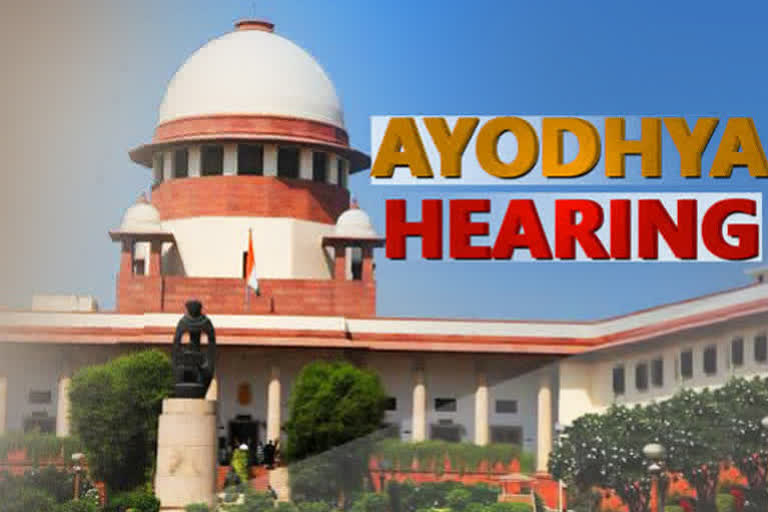New Delhi: The birthplace of Lord Ram at the disputed site in Ayodhya can also be treated as a "juristic entity" besides the deity himself and is capable of filing lawsuits to lay claim over the land, a Hindu party told the Supreme Court on Monday.
A senior counsel for deity 'Ram Lalla Virajman' was responding to the vehement objection of the Muslim parties that the birthplace of the deity cannot be accorded the 'juridical' status as this plea of the Hindus would oust the Muslims and their any legal claim over the disputed Ram Janmbhoomi-Babri masjid site.
"If the land believed to be the birthplace of Lord Ram is treated reverentially by Hindu public and they have sought to offer worship there as a consequence of 'such' belief (not merely because they have faith in Lord Ram as a deity), the land itself may be treated as a juristic entity alongside the idol that may be believed to manifest Lord Ram as a deity," senior lawyer K Parasaran told a 5-judge Constitution bench headed by Chief Justice Ranjan Gogoi.
The bench, which was hearing the politically sensitive case on 34th day, asked Parasaran as to whether "it has been held that any Hindu temple, including the land, has been accorded the juristic personality".
The senior lawyer told the bench that the belief of Hindus in particular deities, temples and their judicial status can be decided on "case-to-case basis" under Hindu laws and should be aimed at protecting the rights of deities and worshippers.
"The deeming fiction to identify the deity as a juristic person is to ensure that the rights of worshippers, as also the jurisdiction and rights of the deity, are protected. In the absence of a juristic person, where worship is offered to a formless deity, neither the deity's nor the worshipper's rights can be effectively protected," he told the bench which also comprised Justices SA Bobde, DY Chandrachud, Ashok Bhushan and SA Nazeer.
The faith of Hindus is that the spirit of Lord Ram has always existed at the place of his birth and has existed before "any structure or the masjid" was put up, he said.
"The construction of a mosque" atop will not denude the juristic character of the birthplace and "originally, worship at Ram Janmabhoomi was without an idol. In the course of time, an idol was installed".
While speaking to media, Advocate Vishnu Shanker said that the court has given time till Thursday for the Hindu parties to submit their rejoinder and Senior Advocate Sushil Jain representing Nirmohi Akhara would be given one hour for his submissions.
At the outset, senior advocate Shekhar Naphade, appearing for Muslim parties, dealt with legal principles of "res judicata" and 'Estoppel" and said Hindus are barred from filing lawsuits in the matter as a case has been dismissed in 1885.
The principle of "res judicata' under civil law deals with the fact that the same nature of dispute cannot be adjudicated upon twice in a court of law.
Naphade said that in 1885, Mahant Raghubar Das of Nirmohi Akahara had filed a lawsuit seeking permission to construct a Ram temple within the disputed premises. This plea was rejected by the court then.
Referring to the res judicata principle, Naphade said that now the Hindu parties are barred under the law to re-agitate the same dispute.
The court seemed to be in disagreement with the plea of the Muslim parties that the 1885 lawsuit barred Hindus and Nirmohi Akahara to file cases later. Akahara filed another case in 1959 and deity, through its next friend, moved the court in 1989.
"The issue whether mahant Raghbar Das was 'shebait' on behalf of 'Nirmohi Akahara' was not an issue in the 1885 suit and hence, the concept of res judicata does not stop Hindus from filing another case," the bench said, adding "we don't think that this is the correct proposition in law."
Later, advocate Nizam Pasha, appearing for some Muslim litigants, opposed the submissions of Hindu parties that Babri was not a valid masjid under Sharia and Quranic laws and Babur was a sinner.
The bench said it would like to hear the submission of Sunni Wakf Board on the issue whether Babri masjid was a valid mosque under Sharia law and said this law is still applied with regard to wakf.
Pasha said Sharia law is not at higher pedestal then the law of the land.
"The issue is whether Babur was bound by Quranic injunctions or not and if Babur violated these then what will happen," the bench asked, adding that it was not here to decide whether the emperor was a sinner or not.
Pasha rebutted submissions of a lawyer, representing a Hindu party, that Babri lacked the characteristics of a mosque under the Islamic law as it did not have either 'minarets' or place for 'wazoo' inside.
"It is admitted by Hindu parties that Babri Masjid was constructed by a sovereign. A sovereign ruler claimed ownership over the land and ordered a mosque to be constructed. Therefore, there is no question of the action of the sovereign being illegal under the law then applicable. Legality or illegality has to be judged on the touchstone of the law then applicable," the lawyer said.
In any event, a constitutional court now cannot evaluate the validity of the actions of a sovereign undertaken 500 years ago and hold that his actions were illegal according to principles he should have conformed to or claimed to conform to, he said, adding that the Babri was a valid mosque.
Fourteen appeals have been filed in the apex court against the 2010 Allahabad High Court judgment, delivered in four civil suits, that the 2.77-acre land in Ayodhya be partitioned equally among the three parties -- the Sunni Waqf Board, the Nirmohi Akhara and Ram Lalla.
Also Read: SC refuses to entertain further Vaiko's plea seeking production of Farooq Abdullah



